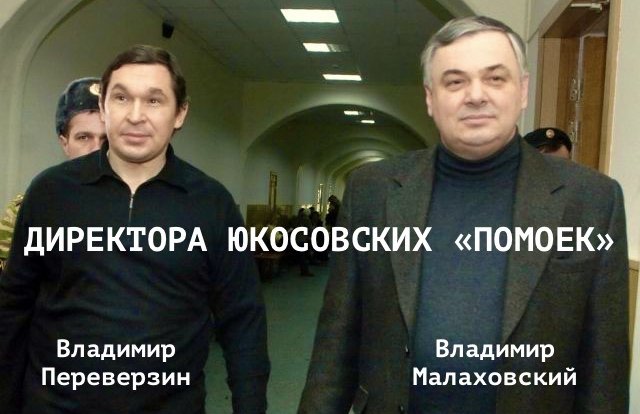
Директора юкосовских «помоек» Владимир Малаховский и Владимир Переверзин «намыли» 13 млрд. долларов и успели легализовать 8,5 млрд. Что было 1 марта 2007 года
В этот день, 1 марта 2007 года, директоров «помоек» Юкоса признали виновными в хищении и отмывании 13 млрд. долларов. Экс-руководитель компании «Ратибор», генеральный директор ООО « Энерготрейд» Владимир Малаховский и главный специалист Московского представительства компании «Рутенхолд Холдингс Лимитед», замдиректора дирекции внешнего долга «Юкоса» Владимир Переверзин, судом были признаны виновными в «хищении имущества в особо крупном размере, совершенном организованной группой лиц» (ст. 160, ч. 4 УК РФ) и «легализации организованной группой денежных средств, приобретенных преступным путем» (ст. 174.1, ч. 4 УК РФ).
Как было установлено в ходе разбирательств, «подсудимые в составе преступной группы через подконтрольные Юкосу фирмы, выступая фиктивными собственниками, по искусственно заниженным ценам скупали сырую нефть, после чего продавали её по завышенным». Отмечалась, что цена превосходила реальную в 3,5 раза.
По данным следствия, общая сумма похищенного составила 13 млрд. долларов, из которых 8,5 млрд. долларов были легализованы.
«ЛЬГОТНИКИ» СЕРЫХ СХЕМ
Данный «рыночный» насос работал, если кратко, следующим образом. Нефть, добываемую дочерними предприятиями НК «Юкос» похищали путём оформления фиктивного права собственности на подставные компании, выводя её по заниженной цене, затем продавали на фиктивных торгах. После чего, продукция номинально уходила в адрес подставных фирм, в том числе на Кипре, например, компанию «Пронет Холдингс Лимитед» (Pronet Holdings Limited). Реальными же покупателями по (завышенной цене) являлись потребители из Европы и других стран.
Подсудимые Владимир Малаховский и Владимир Переверзин были руководителями, задействованными в схеме. И в отличие от «генеральных директоров» с улицы, были связаны с руководством компании Юкос и понимали, чем занимаются, хотя в суде это активно отрицали.
Кроме того, многие фирмы из схемы «прогона» были «налоговыми льготниками», зарегистрированными в российских регионах. Такие фирмы могли получать льготы в обмен на вклад в развитие льготной территории. Однако получение налоговых льгот в руках Юкоса стало всего лишь «грязной схемой» ухода от налогов.
«Подставной характер и формальный характер деятельности ООО «Ратибор», ООО «Энерготрейд», ООО «Ю-Мордовия», ООО «Фаргойл», ООО «Эвойл», ООО «Террен», ООО «Мега-Альянс», ЗАО «ЮКОС-М», ООО «Ратмир» подтверждался не только анализом «хозяйственной» деятельности», экспертизой, актами налоговых проверок, но и показаниями допрошенных в судебном заседании свидетелей» – отмечалось в материалах суда.
(См. «Льготная саранча из «Юкоса». Шесть «фирм-прокладок» под присмотром депутата Дубова и «Кровавого сенатора» Невзлина)
Например, - как следует из материалов дела, - «в январе-мае 2001 года основным номинальным перекупщиком сырой нефти, на которого члены организованной группы переводили по заниженным ценам фиктивное право собственности на всю нефтедобычу ОАО «Юганскнефтегаз», ОАО «Томскнефть» ВНК и ОАО «Самаранефтегаз», являлось ООО «Ю-Мордовия». В Мордовии у Юкоса были налоговые преференции, с которыми пришлось разбираться и налоговой инспекции, и следствию. Фиктивные торги «скважинной жидкостью» им обеспечивала группа с участием исполняющего обязанности главы «Юкос-РМ» Михаила Елфимова.
МУТНЫЕ СХЕМЫ- БЛИЗНЕЦЫ
Схема «продаж нефти», за исключением некоторых нюансов, во многом воспроизводила схему торговли «апатитовым концентратом».
После того, как полномочия исполнительных органов ОАО «Юганскнефтегаз» были переданы управляющей компании ЗАО «Юкос ЭП», сбытовая схема была выстроена из посредников, связанных с НК Юкос. А основная доля прибыли, получаемой от реализации нефти и нефтепродуктов, как на внутреннем, так и на внешнем рынке, поступала не на сами нефтедобывающие предприятия, за исключением небольшой наценки, уходила посредникам из схемы Юкоса. Так, основными покупателями нефти, добытой ЮНГ в период 2000-2004 годов являлись ООО «Эвойл», ООО «Ратибор», ООО «Фаргойл», ООО «Ю-Мордовия» и ООО «Энерготрейд», то есть посредники. При этом они не были самостоятельными, как уверяли защитники «Юкоса» в налоговых судах, а в связке входили в масштабную схему с единым центром управления.
Суд установил, что подсудимые Владимир Малаховский и Владимир Переверзин входили в состав преступной группы. «Участниками преступной группы был предпринят комплекс мер, направленных на подготовку преступления, непосредственное его совершение, а также на сокрытие следов преступления, что суд расценивает, как его тщательное планирование и подготовку» - указал суд.
Характерная деталь – хамское отношение в Юкосе к тем, кто рисковал своей свободой ради благосостояния «основных акционеров», - вскрылась в ходе процесса. В своих показаниях свидетель Переверзина О.И. отметила, что увольнение её мужа из компании «Рутенхолд» было связано с низкой заработной платой. По этому поводу Переверзин В.И. общался с сотрудником компании Юкос Мизамором, которому направлял письма, получив ответ о том, что Переверзин В.И. является простым административным работником, и «если его что-то не устраивает, он может уезжать с Кипра».
ОГРАБЛЕННЫЕ «ДОЧКИ» НК «ЮКОС»
Гражданскими истцами ОАО « Юганскнефтегаз», ОАО «Самаранефтегаз» и ОАО « Томскнефть» ВНК заявлены гражданские иски о возмещении материального ущерба, причинённого преступлением, на сумму 562.125.527.444 рубля 15 коп., 77.000.000.000 рублей и 93.000.000.000 рублей соответственно, однако в ходе судебного разбирательства установлено, что согласованными действиями всех участников организованной группы, в состав которой входили Малаховский В.Г. и Переверзин В.И., ОАО « Юганскнефтегаз», ОАО «Самаранефтегаз» и ОАО « Томскнефть» ВНК причинен материальный ущерб на общую сумму 399,6 млрд. рублей – гласил приговор, где суд отметил право ограбленных «дочек» проводить разбирательства по взысканию украденного в гражданском процессе.
Оба подсудимых были признаны виновными по ч.4 ст.160 УК РФ и по ч.4 ст.174.1 УК РФ. По совокупности содеянного, Переверзину назначили 11 лет лишения свободы. Малаховский получил срок 12 лет лишения свободы.
Владимир Переверзин, после ряда корректировок законов по «экономическим» статьям, был освобождён 15 февраля 2012 года после 7 лет и 2 месяцев заключения. «На путь исправления» Переверзин так и не встал, сейчас он продолжает отмазывать себя и заодно своих хозяев из Юкоса. Впрочем, по ходу дела написал несколько тюремных рассказов.
Владимир Малаховский вышел на свободу в октябре 2012 года. Ему помогло смягчение ряда законов в сфере преступлений экономической направленности.
(См. предыдущий материал «В этот день судья Летиция Кларк отказала налоговым уклонистам. «Попытка Юкоса превратить систему банкротства США в убежище для налоговых правонарушителей была отвергнута судом Техаса». Prigovor.ru напоминает, что было 28 февраля 2005 года»)